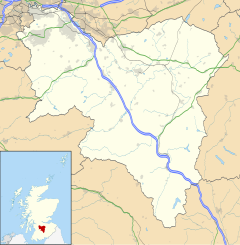Douglas, South Lanarkshire
Douglas
|
|
|---|---|
 St Bride's Kirk, Douglas |
|
| Douglas shown within South Lanarkshire | |
| Population | 1,620 |
| OS grid reference | NS8330 |
| Council area | |
| Lieutenancy area | |
| Country | Scotland |
| Sovereign state | United Kingdom |
| Post town | LANARK |
| Postcode district | ML11 |
| Dialling code | 01555 |
| Police | Scottish |
| Fire | Scottish |
| Ambulance | Scottish |
| EU Parliament | Scotland |
| UK Parliament | |
| Scottish Parliament | |
Douglas (Scottish Gaelic: Dùbhghlas) is a village in South Lanarkshire, Scotland. It is located on the south bank of the Douglas Water and on the A70 road that links Ayr, on the West coast of Scotland, to Edinburgh on the East, around 12 miles south west of Lanark. The placename is of Gaelic origin, derived from the Old Gaelic dub and glais, meaning "dark stream", in reference to the Douglas Water. The Douglas family took this name when their ancestors settled here in the 12th century.
The village grew to service the nearby Douglas Castle, the seat of the Lords of Douglas. The first recorded mention of the Parish of Douglas is in a charter of Bricius de Douglas, Bishop of Moray dated between 1203-1222 to the monks of Kelso Abbey which is witnessed by Freskin Parson of Douglas, brother to the bishop. The castle was well established by the time of William the Hardy when he was called upon to imprison Hugh de Abernethy there in 1288 and where Abernethy died at some point before 1293. The castle was occupied for some time by English forces during the Scottish Wars of Independence. However the castle was liberated by Sir James Douglas when in 1307 he and some followers trapped the English garrison inside the Castle chapel whilst they were worshiping and burnt it to the ground, causing some damage to the castle.
...
Wikipedia

